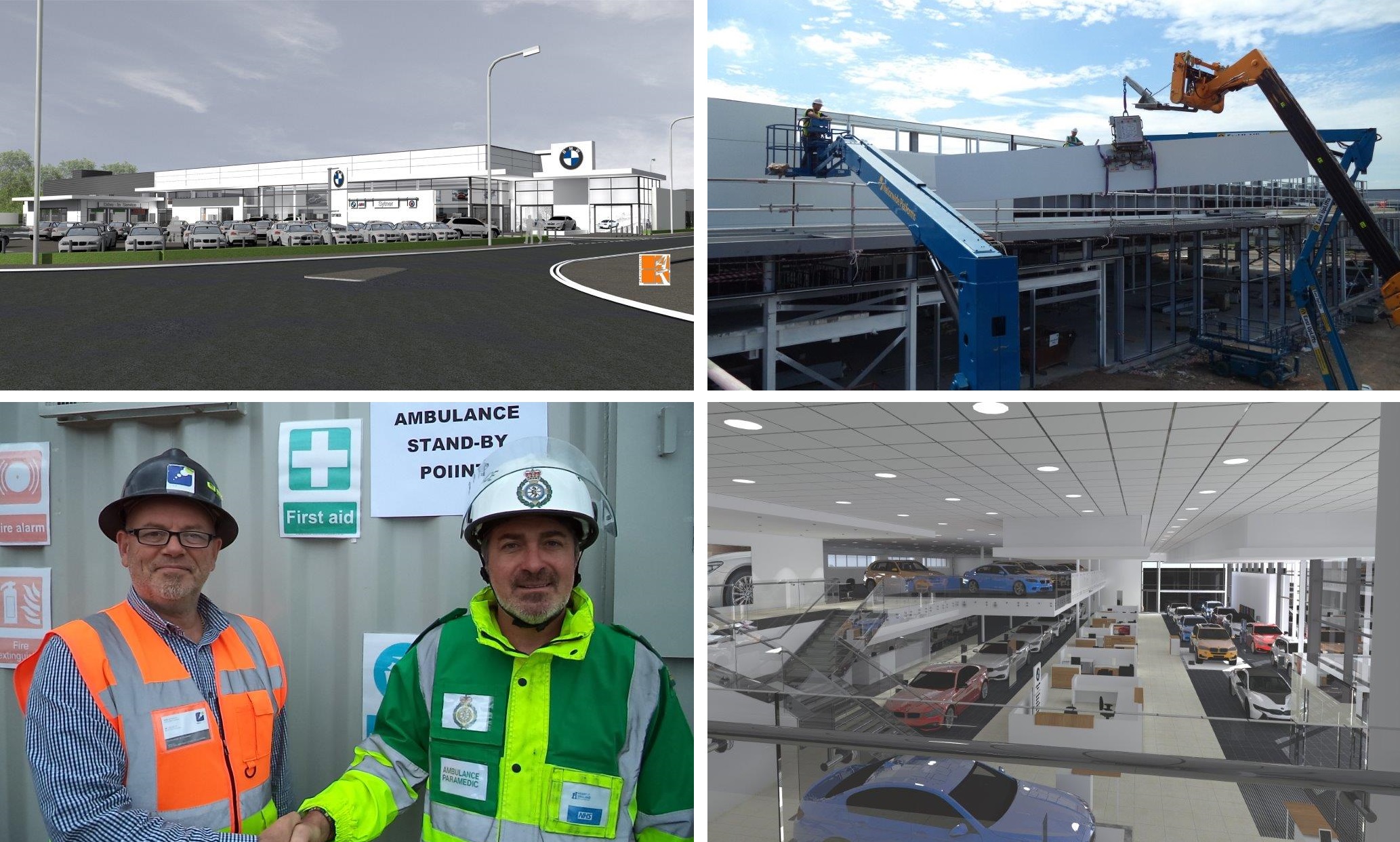MCS Build’s construction of a BMW showroom is commended for its innovation
Specialist contractor MCS Build Ltd’s Sytner BMW Tamworth has been highly praised for its innovative literacy and numeracy workshops and first aid training.
Based in Warwickshire, MCS Group Ltd is a building contractors specialising in the motor, retail, commercial, industrial, residential and educational sectors.
The new BMW car dealership in Tamworth adds another flagship facility to the Sytner Group’s UK stock of over 100 showrooms. The building itself is a steel frame construction with the building’s ultra-modern facades finished in a mixture of white and silver cladding, curtain walling and glass.
Internally to the ground floors, the building incorporates a main showroom for car display and sales, a main reception with a separate service reception, and drive-through service centre.
It also encompasses offices, customer toilets, a parts department, café, a 22-bay workshop, unit repair, and passenger and goods lifts. The first floor includes further car sales and display, staff toilets, showers and locker rooms, offices, and archive storage.
Outlining the external layout, Senior Project Manager Tony Embleton said:
“There is a car ramp leading to a roof deck car park for 122 cars and a separate valet bay with both jet wash and automatic car wash facilities. Then the main external zones cater for further display areas and customer parking, all finished off with some soft landscape zones and areas.
One inventive aspect of the project stemmed from a bright idea suggested by the assistant manager, a former qualified advanced paramedic with over twenty years’ service.
It was his insight to contact the local ambulance authority and develop a Stand Point for rescue paramedic cars and ambulances. This not only served as a positive benefit to the industrial and commercial park, but also to the residents of Tamworth.
Another clever idea devised by the project team was establishing a series of useful workshops for workers experiencing numeracy and language difficulties.
Tony Embleton said:
“During on-site inductions, it became apparent that a number of individuals had difficulty with numeracy and literacy. It was during the early days of the project that this idea was born. To help assist the individuals, a workshop was set up on a weekend basis, funded voluntarily by the onsite team. Courses were attended by groups, but provision was also made to incorporate and facilitate the individuals on a one-to-one basis.”
“Incorporating a personal approach has highlighted issues that otherwise would have lain dormant. A prime example was to set up workshops allowing individuals to consider alternative careers within the industry, via college, university and NVQs.
“This has had a significant effect on the workforce, to become self-aware, and the opportunity to reflect and analyse their personal and professional development.”
Here are some examples of best practice initiatives carried out by MCS Build:
- The site portrayed an excellent and positive image of the industry and the CCS, being bounded by neat, open Heras fencing with clear signage.
- A road sweeper visited the site three times per week.
- The site compound had marked bays and facilities were screened from view.
- The company dress code was enforced for all members of the workforce.
- Regular litter picks and facility cleaning were completed by company personnel and signed off.
- Good housekeeping and cleanliness were part of the induction and toolbox talks.
- Subcontractors were required to clean up their own rubbish and penalties could be enforced.
- There was an extensive company website and the company also issued monthly newsletters to promote its values and identity.
- Local shops were supported and around 90% of the labour force lived within 15 miles of the site.
- The public were encouraged to post comments in the box provided.
- Friday coffee mornings were held and regularly attended by local residents to review performance, targets and deal with any concerns or issues arising.
- Continued toolbox talks reinforced workforce responsibilities and the impact their behaviour could have on the local community.
- Engagement with local schools, colleges and the community helped promote a highly qualified, skilled and professional workforce.
- Spare pallets were passed on to adjacent businesses to reduce waste.
- Little material was taken off site as material was segregated on site.
- An ecological calendar was displayed.
- Environmental audits were completed as part of the health and safety inspections.
- Cabins were eco-friendly and well insulated, with PIR lighting, timed heaters and push taps, as well as van sharing and green company cars.
- Current records show that 96% of waste is diverted from landfill.
- An ‘ecology champion’ was appointed to care for local environmental issues.
- Information was returned to Head Office and an assessment was made of the carbon footprint for comparison with projected targets.
- Carbon footprint assessments included mileages.
- Wastage and carbon footprint assessments were provided to the site and were clearly displayed to the general public in the form of graphs, pie charts and explanations.
- First aid resuscitation equipment was loaned by the ambulance service, in the form of a realistic dummy – ‘resuscitation Annie’ – so active CPR could be practised. This ensured that the individual would be competent in the aid of an unconscious casualty, both adult and infant.
- A full first aid course was delivered, which is due to be accredited through MCS Build Ltd, so that staff could achieve first aider status, equipping them with the knowledge to deal with any scenario.
- In addition to this, a welfare clinic was developed on site, attracting regular attendance, providing eye tests, hearing tests, blood pressure monitoring, sugar testing, urine sampling, heart trace, peak flow and auscultation, to name but a few. This facility has been used several times by members of the public who were shopping in the local area and felt unwell but refused an ambulance. They were directed to site by the local store managers following continuous newsletter send outs, and personal invitations to coffee mornings on site.
- The site introduced a red signing-in register to highlight on-going daily hazards and this was reiterated on the main hazard board.
- Weekly meetings were held with representatives of the workforce to encourage active participation in the site’s development.
- Visitors completed a visitor’s induction and any medical issues were noted.
- There was a 5mph speed limit on site and an emergency evacuation plan in place.
- An award was given to the operative of the month for the best contributions to improvements in site standards.
- A number of educational workshops were held and the numeracy and literacy workshops became very popular, both with British and other EU Nationals. Although this was more challenging and very time consuming, the results were clear to see.
- This was extremely well supported by everyone on-site with no negative or derogatory remarks or stigma attached. It was as a result of these workshops that two fellow colleagues have now found alternative employment within the ambulance service as trainee paramedics, and the site manager still receives periodic updates on their progress.
- An ‘employee of the month’ was introduced, coupled with on-site barbecues and free cooked breakfasts for those working at the weekends. This was to reward and encourage staff to interact with each other, thus reducing barriers.
- The Construction Industry Helpline was promoted on-site.
- There was a considerable display of wellbeing and healthy lifestyle posters and leaflets and advice on issues including mental health.
- A number of apprentices were employed on site.



